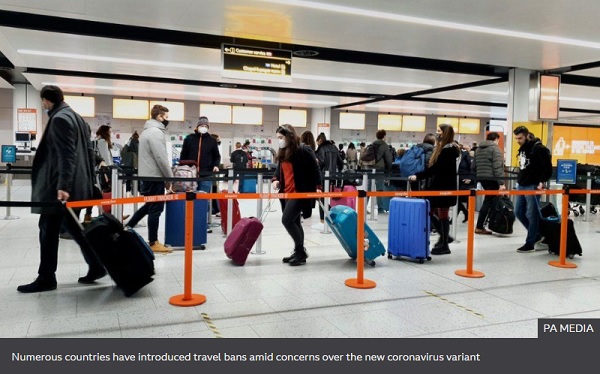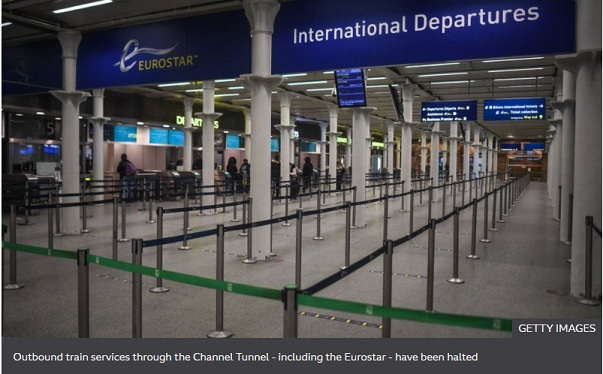
European Union officials will discuss later a co-ordinated response to a new, more infectious coronavirus variant in the UK, which has led many countries to impose travel bans.
Germany, France and Italy are among those to suspend flights from the UK. Outbound train services through the Channel Tunnel have also been halted.
Canada is also blocking UK flights.
Health officials say the new variant is up to 70% more transmissible, but there is no evidence that it is more deadly.
There is also no evidence to suggest that it reacts differently to vaccines.
UK Health Secretary Matt Hancock said the new variant was "getting out of control", while Denmark, Italy and the Netherlands announced they had already detected it.
The European Council meeting of government representatives is expected to take place at 10:00 GMT. The speed at which governments have announced their bans on travellers from the UK shows the scale of the alarm, the BBC's Gavin Lee in Brussels reports.
Also on Monday, the European Medicines Agency (EMA) is expected to approve the Pfizer-BioNTech coronavirus vaccine that is already being administered in the UK and in the US under emergency approval.
Which European countries have acted and how?
The Netherlands said it would ban all passenger flights from the UK until 1 January "at the latest". Ferry passengers arriving from the UK would also be barred although freight would continue.
France suspended all travel links, including freight lorries, with the UK for 48 hours from midnight on Sunday. Thousands of lorries move between the countries every day.
In response to France's ban, Eurotunnel said it would suspend access to its Folkestone terminal for traffic heading to Calais. People booked to travel on Monday can get a refund. Trains will still run from Calais to Folkestone.
The ferry terminal at Dover is now closed for all accompanied traffic leaving the UK until further notice because of the French restrictions. UK Prime Minister Boris Johnson will chair a Cobra emergency response meeting to discuss the issue on Monday.

In Ireland, which has significant passenger traffic with the UK at this time of year, the government announced that flights arriving from Britain would be banned for 48 hours at least from midnight.
It also said that "in the interests of public health, people in Britain, regardless of nationality, should not travel to Ireland, by air or sea". Ferry crossings for freight would continue.
In Germany, an order from the ministry of transport said planes from the UK would not be allowed to land after midnight on Sunday, although cargo would be an exception.
Belgium said it was halting flights and trains from the UK from midnight on Sunday for at least 24 hours as a "precautionary measure".
Italy is blocking all flights from the UK until 6 January. Turkey has temporarily banned all flights from the UK as has Switzerland.
Austria is to ban flights from the UK. Bulgaria has suspended flights to and from the UK from midnight but, unlike the short-term measures in many other nations, its ban lasts until 31 January.
What is the situation elsewhere?
Canada has suspended entry of all passenger flights from the UK for 72 hours, effective from midnight (05:00 GMT). Passengers who arrived in Canada from the UK on Sunday would be "subject to secondary screening and enhanced measures, including increased scrutiny of quarantine plans," it said.
Other countries to announce restrictions on UK travel include Israel, Iran, Croatia, Argentina, Chile, Morocco and Kuwait.
Meanwhile, Saudi Arabia has suspended all international flights for one week because of the pandemic.

